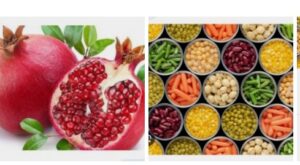By Tajudeen Issa

According to Research
Want to live a long, fruitful life? What you put on your plate could make a major difference. In addition to following an overall healthy eating pattern, moving your body regularly, and incorporating other healthy lifestyle habits, these nine foods could improve your health and increase longevity.
It was once thought that lifespan was primarily determined by our genetics. While having “good” genes plays a role, your genes may only be responsible for 20% of how long you live. The rest is dependent on your lifestyle—diet, environment, activity level, social connection, and more. Modern medicine also undoubtedly contributes to longer lifespans, but aging well isn’t just about making it to a certain birthday, it’s also about living all of those years to their fullest capacity!
In recent years, there has been a lot of attention on what’s referred to as the Blue Zones — or the five regions of the world with some of the healthiest people who consistently live to over 100 years old. In these regions there is an emphasis on eating mostly plant-based foods including 300g (3-10 cups!) of vegetables per day and regular legume and whole grain consumption. The Mediterranean Diet—which is also centered around plants—is another dietary pattern that is commonly linked to living longer.
“When I think of eating for longevity, my mind goes right to the Mediterranean Diet,” says Beth Stark, RDN, LDN, a Pennsylvania-based registered dietitian and nutrition communications consultant. ” It’s a highly nutritious way of eating that includes an abundance of plant foods like whole grains, fruits, vegetables, nuts, seeds, beans, oils and seafood with lesser amounts of lean meats, poultry and dairy. In fact, plant foods often make up the center of the plate at meals, while the other foods are enjoyed on the side,” says Stark.
While overall eating patterns make the biggest impact on longevity, there are many powerhouse foods that can help you live longer and healthier. (Try these 12 anti-aging foods to make your skin look years younger.)
Read on for the top foods to eat to live longer and age as gracefully as possible.
1. BEANS
“Beans are notorious for containing healthy-aging nutrients. From plant-based proteins to fiber to antioxidants, these little powerhouses pack a punch in the nutrition department. And since data shows that eating a plant-based diet is linked to reduced risk of early death, swapping out a heavy animal protein with beans a few times a week is a wise choice to support overall health,” says Lauren Manaker, M.S., RDN, LD, Charleston-based dietitian and author of Fueling Male Fertility.
A staple in the Mediterranean diet, beans contain compounds linked to reduced cancer risk. Regularly eating beans may also reduce risk of type 2 diabetes, lower cholesterol, and reduce inflammation.
All beans contain important nutrients that can ward off disease and promote longevity, so aim for a variety, but most importantly, choose the ones you like.
2. CRUCIFEROUS VEGETABLES
Broccoli, cauliflower, Brussels sprouts, cabbage, and other cruciferous vegetables are often talked about in their relation to a healthy digestive system (which is incredibly important for overall health), but eating these crunchy vegetables is also linked to a number of benefits related directly to living longer. They’re rich in fiber, antioxidants and vitamins A,C and K — all of which are associated with healthy aging.
Sulphorphane, an antioxidant primarily found in cruciferous vegetables, is known to have anticancer benefits, provide possible protection against heart disease, and even support blood glucose control in people with type 2 diabetes.
Roast, shred into a slaw, sauté with garlic and oil, or add to a soup. These are just a few of our favorite ways to take advantage of that cruciferous crunch. Try our Healthy Brussels Sprouts Recipes or our New Cauliflower Recipes for inspiration.
3. BERRIES
Berries have long been studied for health benefits ranging from reducing risk of cardiovascular disease, protection against cancer, and lower levels of inflammation.
What’s even more intriguing about berries is their potential effect on brain health. The Nurses Health Study, which followed over 16,000 participants over the age of 70, found that greater intakes of blueberries and strawberries were linked to slower cognitive decline. Another study showed that blueberry extract may actually improve memory.
“Whether you favor strawberries, raspberries, blueberries or blackberries, they all offer a bounty of health-protective vitamins, minerals, antioxidants and fiber. The antioxidant content of blueberries, raspberries and blackberries also ranks among the highest of all fruits and enables them to combat free radicals that can cause damage to your cells, as well as inflammation, ” says Stark.
In many regions, fresh berries are only available (or affordable) for a few short months of the year, but frozen berries are just as nutritious as they are picked at their peak ripeness. Enjoy them straight out of the container as a snack; on your yogurt or oatmeal; in a salad or smoothie; or made into a salsa for fish or poultry.
4. DARK LEAFY GREENS
“Over and over again, data shows that eating dark leafy greens is linked to a slew of health outcomes, including reduced risk of early death,” says Manaker. One meta-analysis of 13 studies found that regular leafy green consumption was associated with a 15.8% lower risk of developing cardiovascular disease.
Other research suggests benefits such as from improving mental sharpness to reducing risk of age-related macular degeneration (AMD). One study that followed 2,800 participants for 15-years found a 35% lower risk of AMD in those that regularly consumed nitrates from vegetables like leafy greens. Dark leafy greens also contain zeaxanthin and lutein, two antioxidants that are linked to better eye health.
Don’t feel like you have to crunch on kale all day every day to reap the benefits. All leafy greens from collard greens and arugula (try this Citrus and Arugula Salad) to bok choy and mustard greens offer similar benefits.
The #1 Tip for Keeping Your Brain Sharp As You Age, According to a Neurosurgeon
5. WALNUTS
While all nuts offer health benefits, walnuts stand out when it comes to disease prevention and healthy aging. Eating walnuts is continually linked to better heart health, lower risk of cancer, reduced inflammation, blood sugar control in people with type 2 diabetes, and better brain health.
One study even suggests that regular walnut consumption could help you live longer. Researchers analyzed 18 years of data from the Nurses Health Study and the Health Professionals Follow-Up Study found that eating at least 5 servings of walnuts per week was associated with women living 1.78 years longer and men living 1.94 years longer.
Experts believe these benefits come from a combination of the alpha linoleic acid (ALA), an omega-3, the monounsaturated fats, and certain polyphenols found in walnuts. Polyunsaturated fats, including omega-3s, have also been linked to less joint pain, which may improve quality of life as we age.
Not a regular walnut eater? Try our Walnut-Rosemary Crusted Salmon, Strawberry and Spinach Salad with Avocado and Walnuts, or Banana Raisin, and Walnut Baked Oatmeal for some longevity-promoting meals.
6. OLIVE OIL
Another staple in the Mediterranean Diet, olive oil is packed with health promoting compounds. In addition to monounsaturated fats, olive oil contains polyphenols known for their anti-inflammatory properties, among other benefits. “One study evaluating over 7,000 people showed that each 10 gram increase in extra-virgin olive oil consumption per day was linked to a 7% reduced risk of early death” says Manaker.
Research has also shown that regular olive oil consumption may slow telomere shortening. Telomeres are part of the DNA structure and shorter telomeres are considered a hallmark of aging. One study among people over the age of 50 found that olive oil consumption improved the ‘successful aging index,’ which measured a variety of physical health outcomes such as cardiovascular disease risk-factor along with social and mental health outcomes commonly associated with aging.
Use olive oil when cooking as well as in dressings, sauces, or to drizzle on a finished dish for a flavor burst.
7. SALMON
“Salmon and other fatty fish supply vital omega-3 fats, lean protein, B-vitamins, selenium and iron, which offer health benefits such as lower risk of heart disease and an 80-90 percent lower risk of sudden cardiac death,” says Stark. “A seafood-rich diet has also been linked to lower risk for depression and improved memory and cognition,” she adds.
One analysis of several studies showed that eating just over 2-ounces of fish per day was associated with a 12% lower risk of dying of all causes. Another large study found a 38% reduced risk of death from Alzheimer’s Disease, 20% lower risk of dying of cancer, and 15-18% lower risk of death from cardiovascular disease among regular fatty fish eaters.
“Unfortunately just one in 10 of us reach the minimum weekly recommendation of two, 4-ounce servings. To up your intake, swap fish into your family’s favorite recipes like tacos, pasta, casseroles and even pizza,” recommends Stark.
Try our Salmon Tacos with Pineapple Salsa for an easy and crowd-pleasing addition to your dinner rotation.
8. WHOLE GRAINS
Grains (and carbs in general) have been demonized in recent years for their supposed connection to a variety of health concerns, but research truly supports the benefits of consuming whole grains for health and longevity. Whole grains are a staple in the diets of both Sardinians and Ikarians, two Blue Zone regions that follow a Mediterranean-style diet. People of Ikaria live, on average, 8 years longer than Americans and experience 20 percent less cancer, half the rate of cardiovascular disease, and minimal dementia.
One review found that consuming three servings of whole grains per day was associated with a 25 percent lower risk of dying of cardiovascular disease when compared to those that ate fewer than that.
Whole grains in their original form such as farro, wheat berries, quinoa, and oats offer the most health benefits, but choosing whole-grain bread and pasta when possible is also recommended. Cornmeal and popcorn are also considered whole grains.
Need ideas for incorporating more whole grains into your diet? Check out our Healthy Grain Bowl Recipes for inspiration.
9. GREEN TEA
What’s in your mug could be just as important as what’s on your plate. Green tea is known for its potential to reduce cancer risk, but the benefits don’t stop there.
One study that looked at green tea consumption and risk of death in those that experienced a stroke or heart attack found that the biggest tea drinkers (7 cups per day) had up to a 62 percent lower risk of death when compared to non-green tea drinkers. If that sounds like more green tea than you can stomach, not to worry — some benefits were still seen in those that drank one to two cups per day. “Green tea contains a unique polyphenol that has been shown to offer many heart health benefits, and likely contributes to this positive benefit of lower risk of death,” notes Manaker.
Not a big tea drinker? Try adding it to a smoothie with our Green Tea Smoothie.
SUMMARY
For a long, fruitful life, fill your plate with mostly plant foods and follow a healthy eating pattern like the Mediterranean Diet. Aim to eat more of these powerhouse foods if you enjoy them, but know that no one food is going to determine how long you live—it’s your overall diet and lifestyle that makes the biggest difference.









